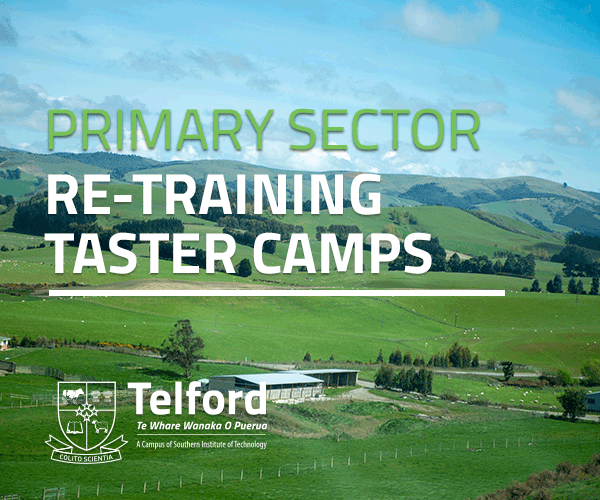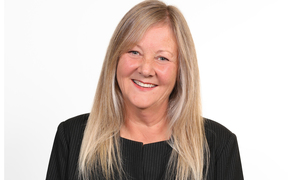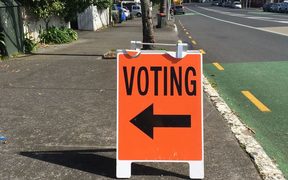Election 2020: Labour candidate Jon Mitchell starts his campaign for Southland
Marjorie Cook
28 July 2020, 5:40 PM
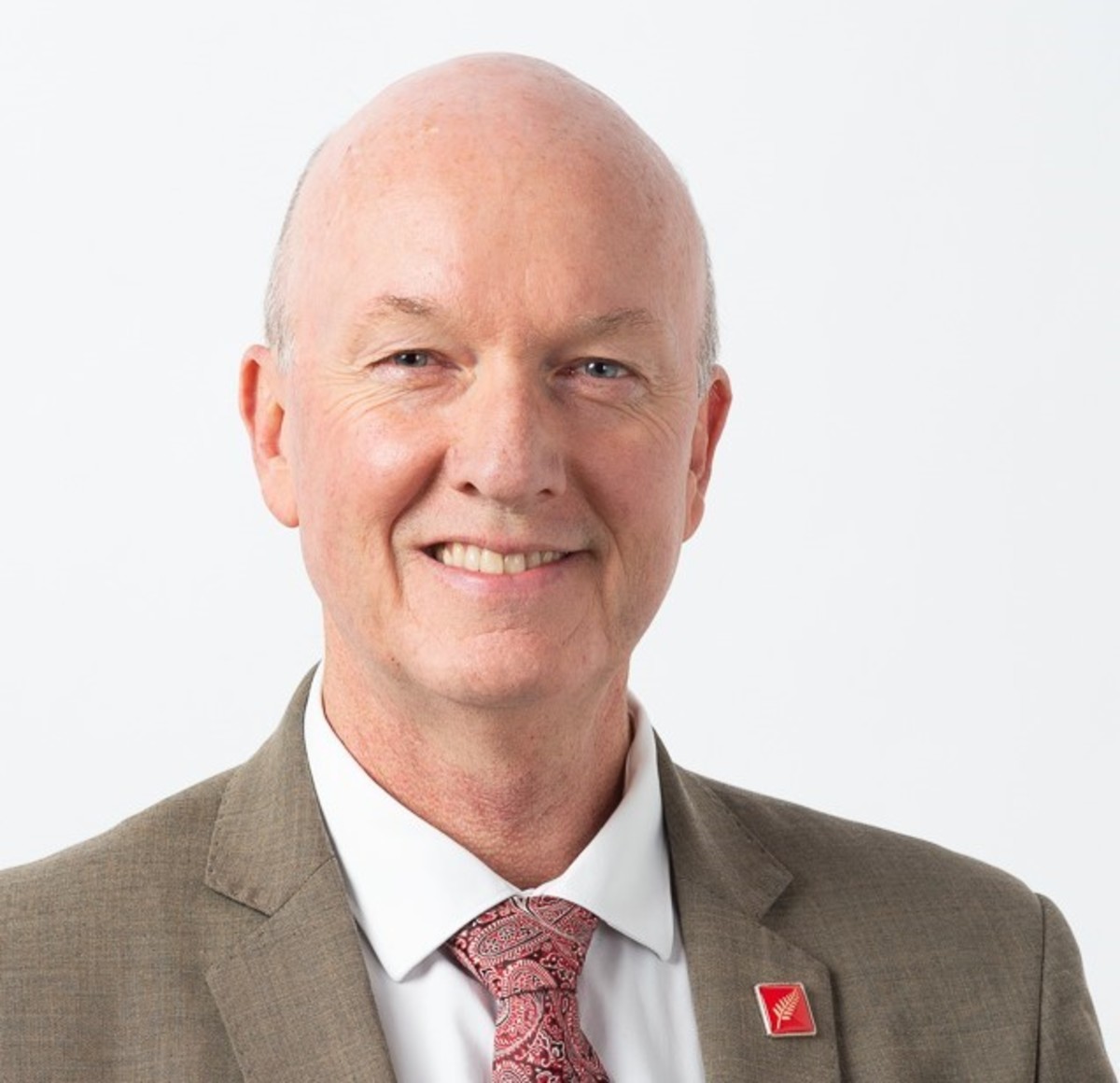 Emergency and disaster management specialist Jon Mitchell is the Labour Party candidate for Southland. PHOTO: SUPPLIED
Emergency and disaster management specialist Jon Mitchell is the Labour Party candidate for Southland. PHOTO: SUPPLIEDLabour Party candidate Jon Mitchell is enjoying running for Parliament - literally.
The Queenstown born-and-bred, first-time political candidate is competing in the Meridian Hydro Half Marathon in Te Anau on August 8.
He is also building a house at Garston and on Monday was banging up election hoardings around the town of Alexandra – a surprising but worthy addition to the new Southland electorate following the recent electoral boundary review.
Mr Mitchell is standing in a true-blue National Party stronghold, despite the last two Clutha-Southland incumbents testing the patience of their party leaders and resigning in ignoble circumstances before they had fully completed one term in office.
Perhaps this time, Southland might see red and vote Labour? Mr Mitchell was certainly hoping so when contacted by the Southland App this week.
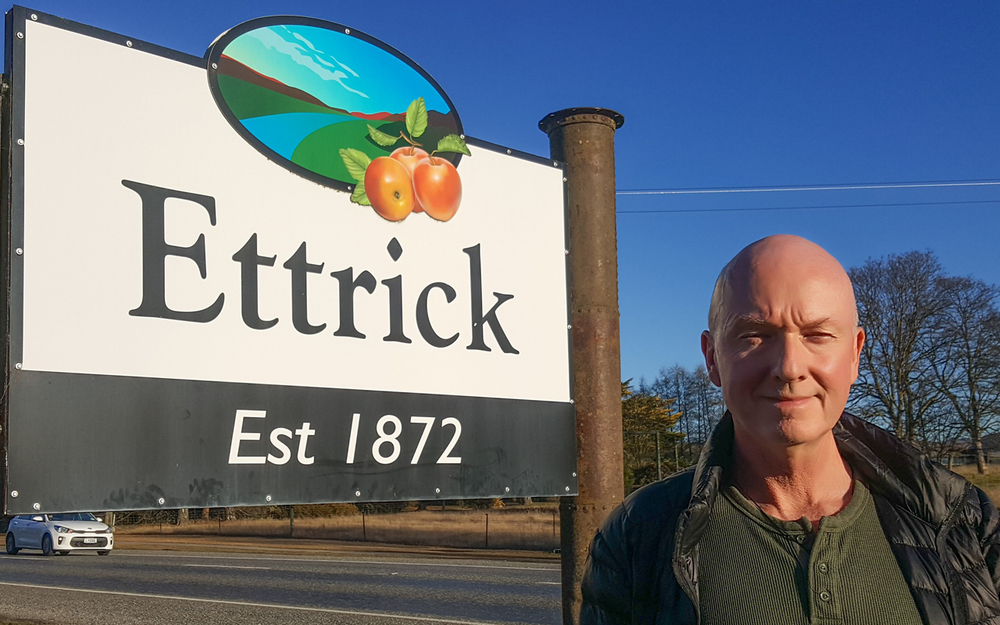
Mr Mitchell has been visiting small towns in the newly defined Southland electorate this week. PHOTO: Mary Rowland
Mr Mitchell knows a thing or two about managing disasters. He is the deputy director of Response + Recovery Aotearoa New Zealand, a consortium of universities, Te Rūnanga o Ngāi Tahu and subject matter specialists, that delivers disaster response and recovery leadership development programmes on behalf of the government.
He didn’t dwell on the woes of the soon-to-be unemployed Hamish Walker, or of Walker’s predecessor Todd Barclay. He and his “campaign manager” wife Mary Rowland have got other jobs to do, such as meeting and greeting and popping up election signposts around the region.
“I am just getting on with doing what I need to do to represent the electorate and community in Government. I think for too long the electorate, as it was in Clutha-Southland - it was represented, but they haven’t been able to represent the interest of the community in Government. They have had to do it with Hamish in opposition. I think it will be much more effective to have an MP for the electorate actually in Government,” he said.
Already, Mr Mitchell has found himself in demand from future constituents.
“In the last three weeks people have been calling me and asking for help on issues that normally an electorate MP would be helping them with. Because they don’t have one, although there is one still being paid, I am doing that, I am absolutely happy to do so. That’s reality. It’s good practice for if I am fortunate enough to be elected,” Mr Mitchell said.
Southland has been a National safe seat since Bill English won it in 1996. Mr English was immensely popular in Southland and held it until his retirement
.
His successor Todd Barclay won the seat convincingly for National in 2014 before falling from grace over secret recordings of staff phone calls.
Mr Walker also won comfortably in 2017. He got 21,819 votes while the then Labour candidate Cherie Chapman was a distant second with 7,465 votes. Mr Walker tarnished his hard-working reputation by leaking Covid-19 patient details.
Since Covid-19 reared its ugly head this year, the Labour-led Government’s economic rescue and recovery responses – including to Southland’s agricultural base - has been such that Mr Mitchell feels the electorate is questioning its loyalty to National.
“It is not the same electorate it was. We have now got Alexandra in it . . . and Queenstown is actually a different place from what it was three years ago. And also, people’s aspirations throughout Southland have changed.
“People have had the experience of the Covid crisis and the huge, huge support they received from a Labour-led government that they simply would not have got had a National government been in, so people are having to think - what does that mean going forward? They have been looking at that at a national level, but they are also looking at what that means at a local level too.
“The support that the Government is giving to the agriculture sector is something rural Southland is thinking about. There’s celebration of really good environmental work that’s happening on some farms around Southland and the absolutely crucial role agriculture plays in the economy that was proven through Covid. So, people are asking themselves: if that’s the support we are getting from Labour these days, what are we going to do with our vote? It is really interesting.’’
Mr Mitchell grew up in the hills and says Glenorchy, where his parents bought the local store in 1975 and turned it into a café, became a second home.
The tourism sector gave him his first jobs, running lift operations for Coronet and Remarkables ski fields in the winter, and working for the Department of Conservation and Hollyford Walks in the summer.
Mary worked as a ski patroller, so the couple did the snow goose thing and spent a season working at a ski resort in California, Nevada and at Lake Tahoe in the United States, before returning to Queenstown.
They bought their first home in Queenstown in the mid-90s and then decided to head to Otago University to further their education: post-grad geography and planning for Mr Mitchell and a nursing degree for Mary.
Mr Mitchell then taught geography for several years before beginning a local Government career with the Central Otago District Council, working in economic development and emergency planning portfolios.
The couple decided to go overseas again, this time to the United Kingdom, where Mr Mitchell worked in more community and economic development roles, as well as emergency planning during the Foot and Mouth disease response in northern England, major 400-year floods at Leeds, and ethnic unrest after 911.
“Emergency management and disaster recovery have become a big part of what I do,” he said.
The Mitchell family arrived home with two young children and headed to Christchurch, where Mr Mitchell worked as a Canterbury regional emergency management planner before becoming one of the regional controllers for the response to the earthquakes and transition to recovery.
In 2012, Queenstown was calling, so Mr Mitchell got a part time emergency planning role with the Queenstown Lakes District Council, Mary took a job at Lakes District Hospital and the kids were enrolled at Wakatipu High School, the same school their dad went to.
They built an eco-home at Arthurs Point and Mr Mitchell began consulting to the Ministry of Health, “including reviewing the national health management plan, funnily enough’’.
By 2015, his commuting lifestyle seemed an inefficient way of living so the family decided to sell their new house and move to the capital.
But home was where their hearts were. As soon as they arrived in Wellington, they realised they needed their own little patch of South Island, so bought a 10-acre block at Garston, where they are now building.
“It is beautiful. It is in Southland and has a view of Otago. How much better could that be?” he said.
While their adult children remain in Wellington to study at university, Mary has taken leave from her job to support her husband on the hustings.
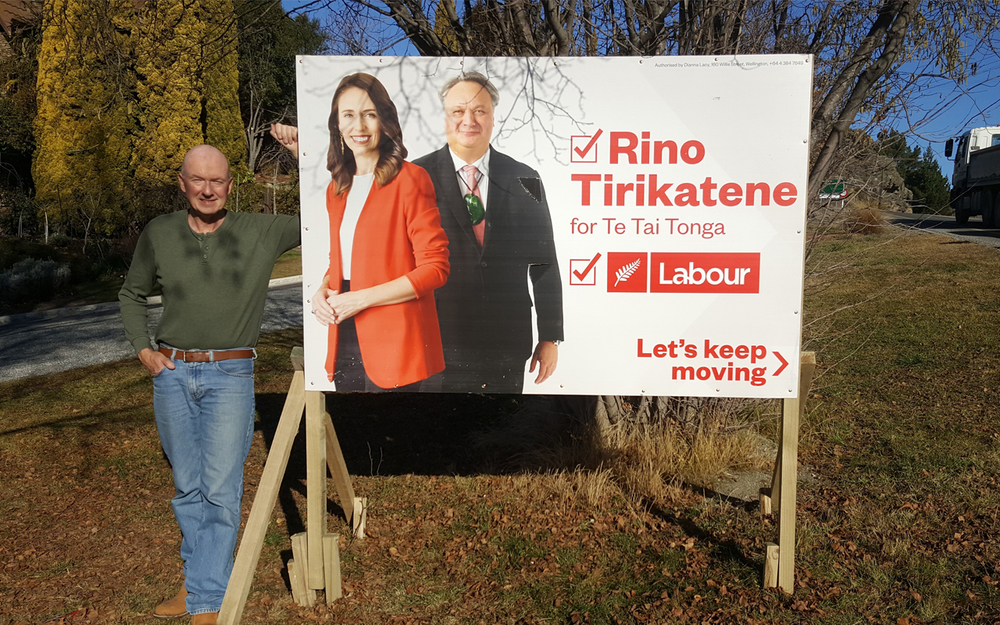
Jon Mitchell is putting up election hoardings around the region this week. PHOTO: MARY MITCHELL
So, should Mr Mitchell be elected to a Labour-led Government, what - apart from being a conduit to the Prime Minister – can he offer Southland?
Leadership during a time of economic and community turmoil, he says.
“Interestingly, when I was in the emergency management role at QLDC, I reviewed the local emergency management plan and one of the things we wrote in there was how vulnerable Queenstown and its economy were to something like a human disease pandemic, because of its impact on tourism.
“The impact of [Covid-19] has been significant on people. There are a lot of friends of mine, and others, who are hurting financially. It is hard on them as families. It is really difficult. At the same time, rental accommodation is almost half what it was before. So, every cloud has a silver lining to some extent.
“It’s an opportunity for the economy to adjust and ideally be more resilient to future shock. We need to take the opportunity through the Covid recovery and leadership that Labour is providing, and will do after the election, to make sure we get the most out of it. Because it will not be business as usual for a long time. And so that sort of leadership at a national and local level is going to be essential,” he said.
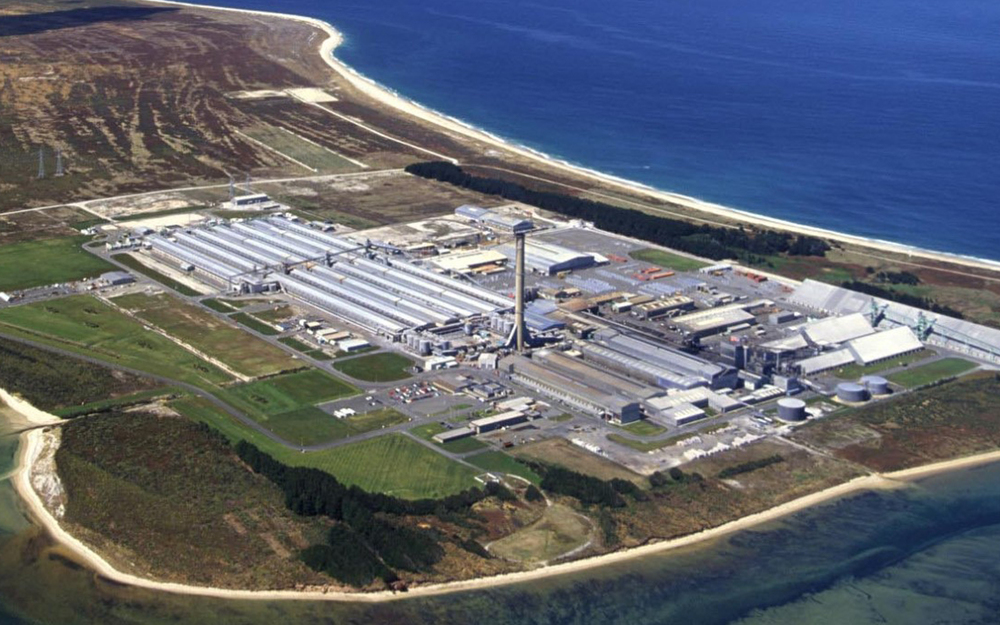
The Labour Party is expected to make an campaign announcement about the Tiwai Point aluminium smelter soon.
Mr Mitchell says Southlanders should get ready for some good news soon after Parliament rises on August 6.
That’s about when the ruling Labour Party is expected to make its major campaign announcements in the lead up to the September election.
Mr Mitchell expects one of these announcements will be a direct boost to Southland’s hopes for a successful transition through the Tiwai Point smelter closure period.
Last week, Coalition party leader Winston Peter scuppered Prime Minister Jacinda Ardern’s announcement of a $100 million fund to assist Southland through the transition.
Mr Mitchell said Mr Peters’ comments about saving the smelter were “unfortunate’’ but he believes Southland will get its money from a Labour-led Government after the election.
He’s also aware things may be about to get a little grim for tourism operators before they get better and that international tourism, whenever it returns, may be a quite different beast to what it was pre-Covid-19.
“Yes, there will be a change, a shift away from mass tourism. Last year, a lot of people, including businesses, were saying it was unsustainable [as it was]. So, we have a once in a lifetime opportunity to adjust,’’ he said.
He’s supportive of the Southern Institute of Technology (SIT), which he says should not vanish in reforms of the vocational education sector.
He’s also supportive of more educational opportunities in the northern part of Southland and for more resources for skills training for young people.
“The role of SIT can’t be underestimated . . . SIT is seen as flagship as an effective polytechnic in New Zealand. Its assets are ring fenced, its future is very bright, its role in New Zealand and the future economy is only going to become more important.’’
Water resources and power generation are also front of Mr Mitchell’s mind. He’s been studying the proposed Lake Onslow hydro scheme in the Dunstan ranges above Alexandra, just inside the new Southland electorate boundary.
The massive, multi-billion-dollar scheme is tipped to be a job-maker and is something for Southlanders to talk about alongside the debate about Meridian Energy’s Manapouri Power Scheme and the Tiwai Point smelter.
This week, Mr Mitchell has attended meetings and events at Lumsden and Te Anau and will be in Queenstown. Next week, he’s going to Kingston and back to Te Anau.
Over the next two months, he intends going to as many community events and candidate meetings throughout Southland as he can.
No-one knows yet who the National candidate will be, but Mr Mitchell has started his race.


